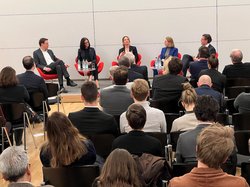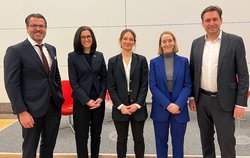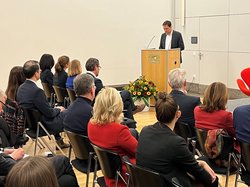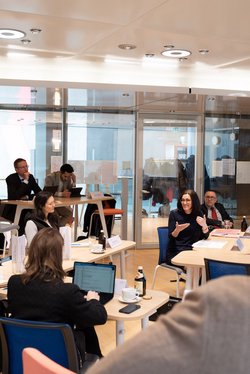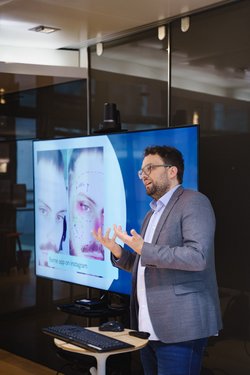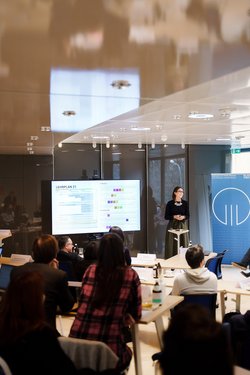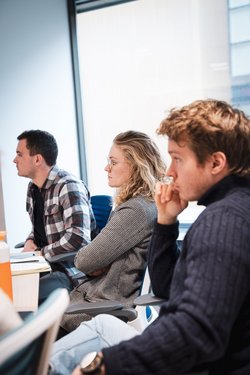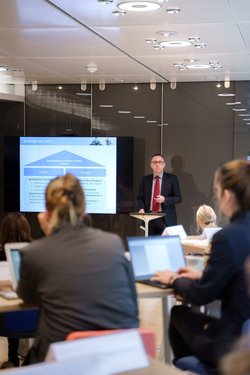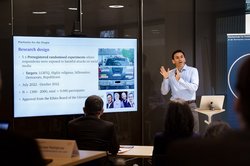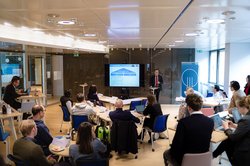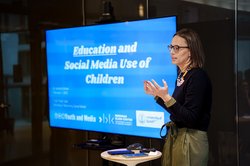News
Rebooting Social Media? A Challenge for Law, Politics, and Society
Event Report |
The aim was to bring together different perspectives from experts from diverse backgrounds dealing with persecuting and researching #hatespeech #online.
31. January 2023 - Evening panel discussion at the Bavarian Justizpalast
In a lively panel moderated by the Bavarian State Minister of Justice Georg Eisenreich and Prof. Urs Gasser, our three guests Teresa Ott hate speech officer at the Attorney General’s Office, Anna Wegscheider, legal council at HateAid, and Svea Windwehr, policy analyst at Google got to discuss implications of the Digital Services Act (DSA) for persecutors, platforms, and users. Impossible to be summarized in full, here are some key takeaways of the debate:
- While the EU-wide harmonization of the DSA was identified to have as significant potential, there were also several setbacks mentioned compared to the NetzDG like the non-inclusion of deletion periods or concrete details concerning enforcement.
- Generally, internal processes at the major platforms regarding the practices of content moderation are still a "Black Box" both for prosecutors as well as for victims of online hate – a fact which could be enhanced through extended cooperation and communication between the actors.
- Only about two out of ten online offenses are currently reported. In order to report and prosecute online hate more extensively, further awareness on digital violence must be raised – not only in the general population, but also in the judiciary and law enforcement. At the latest, with an increasing number of reported cases, additional resources will also become necessary for the responsible authorities.
1. February 2023 - Multi-stakeholder workshop at the TUM Think Tank
The next day, we continued with a workshop on hatespeech online and how to effectively address it, involving a diverse set of stakeholders from academia, civil society, companies and public sector.
- The first session focused on latest insights on hate speech, incivility and misogyny in online discourse. Based on inputs from Yannis Theocharis, Janina Steinert and Jürgen Pfeffer (all TUM & HfP), the participants lively discussed tradeoffs between the need for more drastic forms of content moderation vis-à-vis freedom of speech as a fundamental norm. While there was a broad consensus that we need to get a better understanding of “grey zone” of hate speech – and how to deal with it – there was also clear that some types of online behavior should not be normal. It was also stressed that online hate is spread by comparatively few which are extremely loud and hence gain a lot of traction – with implications for whom to craft policies for: the few haters or the large masses?
- The second session dealt with questions related to the implementation of the DSA with regard to online hate. Following inputs from Till Guttenberger (Bavarian State Ministry of Justice) and Teresa Ott (hate speech officer at the Attorney General’s Office), it was debated how to keep the more extensive measures of the Netz-DG alive once the DSA is enacted and how future institutions and mechanisms should be designed. Moreover, participants were also wondering how to best increase awareness among victims and the general public on ways to report hate speech.
- The third session looked beyond the law to address uncivil discourse online. Here, Christian Djeffal (TUM) spoke about participatory forms of content moderation with the users, while Sandra Cortesi (University of Zurich & Berkman Klein Center for Internet & Society at Harvard University) gave an overview on how to educate children with the relevant skills to navigate online discourses and social media platforms. The big questions here focused on finding the sweet spot between education and regulation – which however is probably not an “either/or” – as well as who is in the best position to create educational contents highlighting that all relevant actors need to be on board.
Continue the conversation on updating our societies’ operating systems
The engaged discussions demonstrated that we need more of these types of events which involve stakeholders of all types of sectors to open up new perspectives as well as listen and learn from each other. We hence look forward to continue this conversation in our Reboot Social Media Lab in the next weeks and months. If you are interested in being part of this discussion on how to update on of our societies' operating systems, do not hesitate to reach out to us.
Our special thanks to all who contributed to the success of this event with their participation and support!

